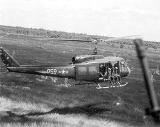
Vietnam War
The Vietnam War was a Cold War-era military conflict that occurred in Vietnam, Laos, and Cambodia from 1 November 1955 to the fall of Saigon on 30 April 1975. This war followed the First Indochina War and was fought between North Vietnam, supported by its communist allies, and the government of South Vietnam, supported by the United States and other anti-communist nations...
Timeline of Events
|
1945
|
|
|||||||||||||||||
|
1957
|
|
|||||||||||||||||
|
1962
|
|
|||||||||||||||||
|
1963
|
|
|||||||||||||||||
|
1964
|
|
|||||||||||||||||
|
1965
|
|
|||||||||||||||||
|
1966
|
|
|||||||||||||||||
|
1967
|
|

